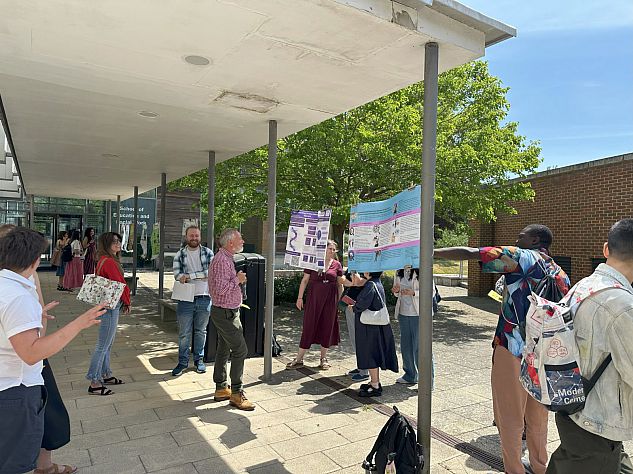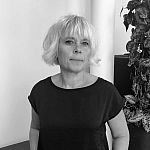Event Spotlight:
Poster Display, Voting & Prize-Giving Event
In April, CSWIR launched a social change-inspired poster competition for Postgraduate Research (PGR) students and Early Career Researchers (ECRs) at the University of Sussex.
We accepted poster submissions from all faculties that demonstrate innovative approaches to:
• Understanding Social Problems in a Changing World
• Relationship-Based Social Justice
• Collaboration in Social Innovation
• Methodological Innovation & Decolonising Research
Our Poster Display, Voting & Prize-Giving Event took place on:
Date: Tuesday 17 June
Time: 12:00-14:00PM
We displayed the posters outside the entrance to Essex House and contestants presented their work to attendees, who then voted for their favourites.
The prize announcement and awards ceremony took place afterwards, and 5 contestants were presented with awards for Research Excellence, Social Enquiry or being an Emerging Researcher, by the CSWIR co-directors, Gurminder Bhambra (Associate Dean for Research and Innovation) and Mario Novelli (Director of Research and Innovation, ESW).
Congratulations to prize-winners and all those who took part!

Welcome to the Centre for Social Work Innovation and Research (CSWIR)
Located within the School of Education and Social Work, CSWIR has been established to advance the international profile and impact of research and innovative interdisciplinary approaches in social work. Our aim is to bring together social work scholars, professionals, and students, and provide a distinctive ground for research and innovation focusing on the changing nature of social relations of social work and other social action interventions.
As an innovation and research centre, CSWIR aims to:
- promote social justice and rights
- support protection and development of vulnerable populations under new global conditions of austerity and inequality
- strengthen the re-articulation of social work as a distinctive mode of collaborative and participatory relationship-based social action.
In CSWIR, we benefit from cross-disciplinary internal, national, and international collaborations and links, and aim to extend and advance our partnerships with scholarly, professional, and governmental bodies.
________________________________________________
Welcoming our current Visiting Research Fellow!
 Dr Anna Melke, Researcher (Research & Development, Gothenburg Region; Social Work, University of Gothenburg)
Dr Anna Melke, Researcher (Research & Development, Gothenburg Region; Social Work, University of Gothenburg)
Dr Anna Melke is a researcher based in Gothenburg, Sweden. She primarily works at the Research and Development Unit of the Gothenburg Region, an association of thirteen local governments covering one million inhabitants. The unit brings together a multidisciplinary team of social science researchers and senior analysts. She is also affiliated with the Department of Social Work at the University of Gothenburg, where she organizes seminars on applied (practice-based) research. In recent years, Dr. Melke has led several research and improvement projects focusing on support for children and parents at risk, including out-of-home care. Currently, she is studying the potential impact of the Signs of Safety model in child protection investigations by comparing services that implement the model with those that do not.
________________________________________________
The Social Work with Older People research project has published its findings
The project shadowed social workers in Local Authority adult social care services for 6 months, and interviewed older people, carers and professionals. This was the first comprehensive and detailed look at what social workers do to support older people and the difference they make.
"The research comprehensively demonstrates the positive impact that social workers can have on older people’s lives, and on unpaid carers and families. However, ageism, lack of investment and pressured services are undermining the potential to promote wellbeing in later life. Simple changes could make a huge difference."
To find out more, visit SWOP's Findings page Research findings – Social Work with Older People Research (wordpress.com) and view their Main Findings report, Summary Report and Policy Briefing.
_______________________________________________
Kitbag: A playful resource for serious work
Check out this podcast in which Professor Gillian Ruch is in conversation with Dr Margaret Hannah, Director of Health Programmes at International Futures Forum, a Scottish charity that has created Kitbag, a resource for building children's emotional and social literacy.

